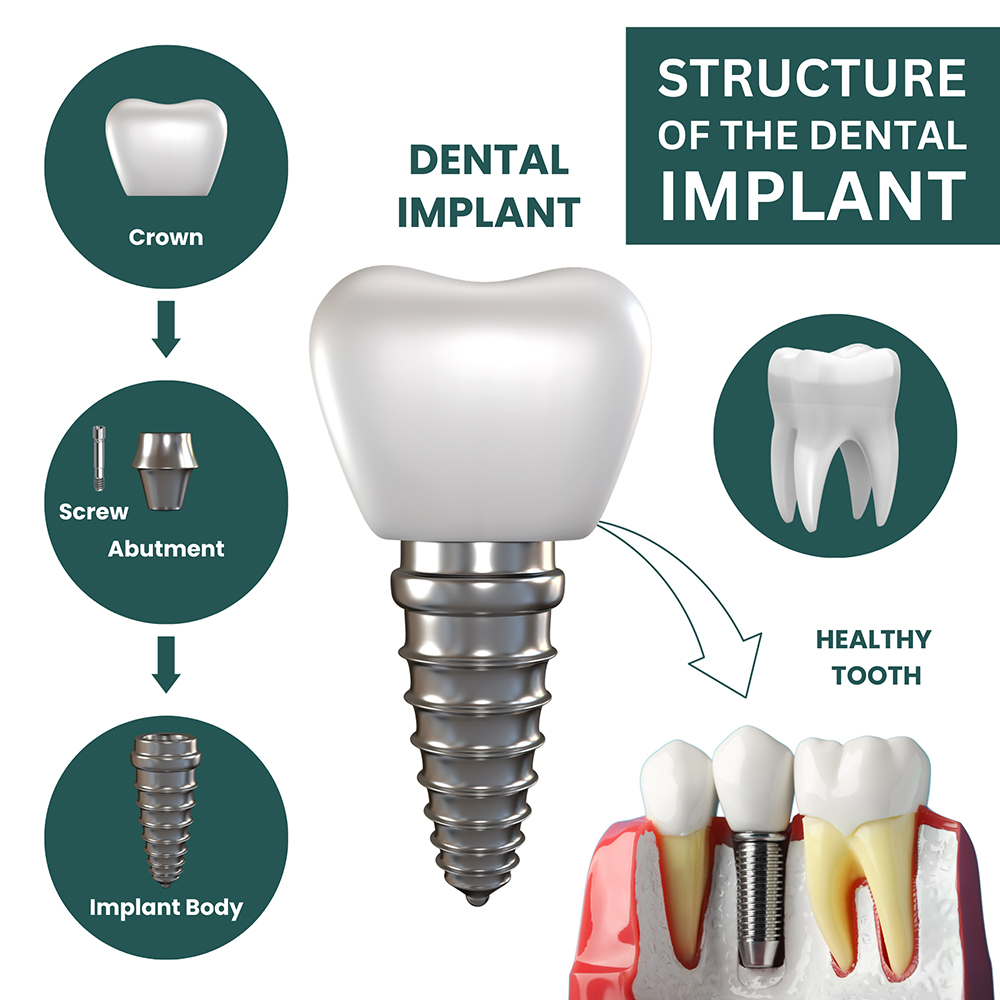The Definitive Guide to Dental Sense
The Definitive Guide to Dental Sense
Blog Article
Dental Sense Things To Know Before You Get This
Table of ContentsDental Sense Things To Know Before You BuyThe 6-Second Trick For Dental SenseGetting The Dental Sense To WorkDental Sense - An Overview
are clinical tools operatively implanted right into the jaw to bring back a person's ability to eat or their appearance. They provide assistance for fabricated (fake) teeth, such as crowns, bridges, or dentures. When a tooth is lost because of injury or illness, an individual can experience issues such as quick bone loss, malfunctioning speech, or modifications to chewing patterns that result in discomfort.Dental implant systems include a dental implant body and oral implant abutment and may additionally consist of an abutment addiction screw. Dental veneers cost. The dental implant body is operatively inserted in the jawbone instead of the tooth's origin. The dental implant abutment is generally attached to the implant body by the joint fixation screw and expands with periodontals into the mouth to support the attached artificial teeth
(https://pubhtml5.com/homepage/vtrmy/)Framework of The Oral Implant System selecting dental implants, speak to your oral company concerning the potential benefits and dangers, and whether you are a candidate for the procedure. Things to take into consideration: Your total health is a crucial consider establishing whether you are an excellent candidate for oral implants, the length of time it will certainly require to heal, and the length of time the implant may remain in location.
Smoking cigarettes may impact the recovery procedure and reduce the lasting success of the implant. The healing process for the dental implant body might take a number of months or longer, during which time you generally have a momentary joint instead of the tooth. the oral implant procedure: Carefully comply with the oral health guidelines provided to you by your dental provider.
Excitement About Dental Sense
Implant failure can result in the requirement for one more procedure to repair or replace the implant system. Recovers the capacity to chew Restores cosmetic appearance Assists maintain the jawbone from shrinking due to bone loss Protects the health and wellness of the bordering bone and gum tissues Assists maintain nearby (neighboring) teeth steady Boosts quality of life Damage to surrounding all-natural teeth during dental implant placement Injury to the surrounding cells during surgery, such as sinus perforation Injury throughout surgical treatment (for instance, fracture of surrounding jawbone) Insufficient feature, such as feeling like the teeth do not bite with each other usually An experience that the tooth is loosened or twisting in position resulting from an abutment screw loosening Implant body failure (looseness of the dental implant body) as a result of systemic infection, which may be most likely in individuals with unrestrained diabetics issues because of local infection in bone and gum tissues supporting the implant body because of delayed recovery, which might be a lot more most likely in individuals that smoke Difficulty cleaning the periodontals around the implant, resulting in inadequate oral hygiene Unattended periodontal disease Post-surgical tingling due to nerve impingement or damage Always alert healthcare carriers and imaging service technicians that you have oral implants before any type of magnetic resonance imaging (MRI) or x-ray procedures.
FDA is not knowledgeable about any type of adverse occasions reported for MRI or x-ray treatments with dental implants. Dental implants systems are normally made from materials that follow international consensus requirements of the International Company for Standardization (ISO) or ASTM International. These requirements have information of what makes a secure product.

An oral implant is a framework that replaces a missing tooth. With screw-like gadgets, the doctor inserts an implant right into the jawbone, and it acts as a support for a fabricated tooth, called a crown.
Some Known Details About Dental Sense
Some people are not eligible for dental implant surgery. It is for dental cosmetic surgeons to run on people with: severe illnessuncontrollable metabolic diseasebone or soft tissue illness or infectionIf these problems are settled, an individual can have the surgical procedure. In, dental surgeons avoid from operating on individuals with: If people with any of the above undergo oral implant surgery, there is a greater danger of the implant falling short.

Oral implant surgery is a customized process. It's not the very same for everyone. However the complying with provides a basic review of what you can anticipate your dentist, dental doctor, periodontist or prosthodontist to do: Place the dental implant surgically. Offer you time to recover. Affix the article and last crown, bridge or denture.
Next off, your surgeon will thoroughly position the oral implant right into your jaw. these details Ultimately, your surgeon will rearrange your periodontals and close the incision with stitches. If your dental implant is near the front of your mouth, your dental expert will certainly make a short-term tooth for you to use until you heal. This way, you will not have a gap in your smile while you recuperate.
Dental Sense for Beginners
Throughout the healing phase, your jawbone must fuse to the oral implant. This process can take anywhere from 3 to nine months.
Once your dental implant heals, your dental practitioner can affix the abutment (tiny connector blog post) and your final repair (crown, bridge or denture). This usually takes concerning one hour to complete and may call for a 2nd minor surgical procedure. You shouldn't really feel any type of discomfort throughout your dental implant procedure because your supplier will make use of drug to numb your periodontals.
Report this page